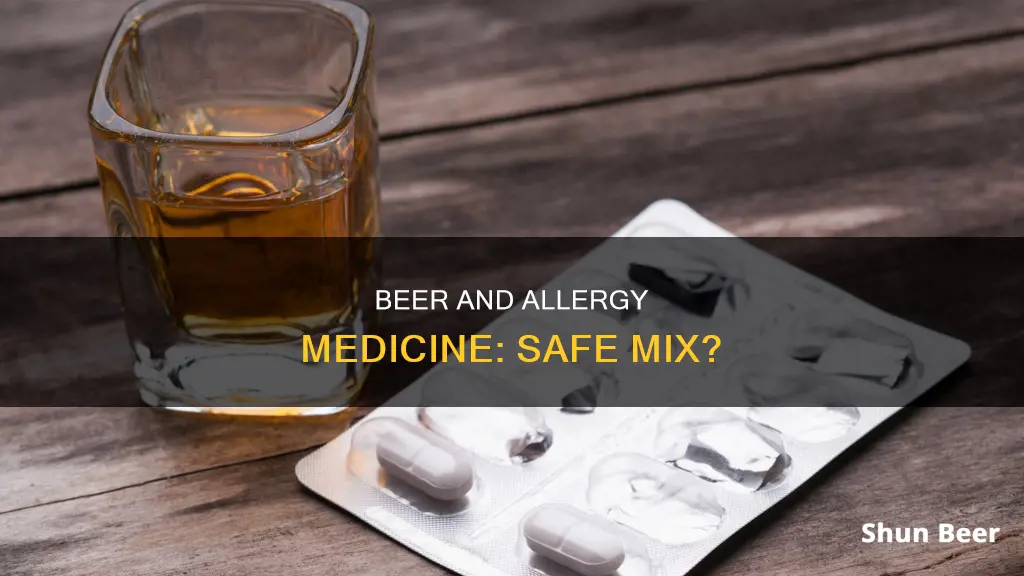
Mixing alcohol and allergy medicine is generally not recommended due to potential side effects and health risks. Alcohol and antihistamines, a common type of allergy medication, can both cause drowsiness and impair coordination and reaction speed, increasing the risk of accidents. Additionally, alcohol may trigger allergic reactions, especially for those with asthma, and worsen nasal allergy symptoms. While second-generation antihistamines like Claritin and Zyrtec are considered safer with alcohol, caution is still advised as individual reactions may vary. It is always best to consult a doctor or pharmacist to understand the potential side effects and risks associated with mixing alcohol and allergy medication.
| Characteristics | Values |
|---|---|
| Mixing allergy medicine and alcohol | Not recommended due to increased risk of drowsiness and potential for dangerous side effects |
| First-generation allergy medicines and alcohol | Should never be mixed due to increased risk of severe drowsiness and potential for dangerous side effects |
| Second-generation allergy medicines and alcohol | Considered safer but caution is still advised as individual reactions may vary |
| Nasal corticosteroids and alcohol | Recommended alternatives for those wishing to consume alcohol as they don't typically cause drowsiness or interact negatively with alcohol |
| Allergy medicine and alcohol tolerance | May vary depending on age, sex, and individual reactions |
| Allergy medicine and alcohol misuse | May increase the risk of dehydration, learning and memory impairment, interactions with other medications, and complications in older people and those with dementia |
What You'll Learn
- First-generation antihistamines like Benadryl and alcohol can cause severe drowsiness
- Alcohol may trigger an allergic reaction, especially in people with asthma
- Combining antihistamines with alcohol may lead to dehydration
- Women are more susceptible to alcohol-related harm due to lower water content in their bodies
- Alcohol and antihistamines can cause serious problems with thinking, judgement, and motor skills

First-generation antihistamines like Benadryl and alcohol can cause severe drowsiness
First-generation antihistamines like Benadryl are known to cause drowsiness and sedation. When combined with alcohol, which also causes drowsiness, the risk of severe drowsiness and unconsciousness increases significantly. This is because both first-generation antihistamines and alcohol interfere with brain communication and function, leading to impaired judgment, coordination, and reaction speed.
First-generation antihistamines, such as Benadryl (diphenhydramine), easily cross the blood-brain barrier and affect the central nervous system, resulting in sedation. This sedation, coupled with the depressant effects of alcohol, can have dangerous consequences. The combination may not only impair your ability to function but also increase the likelihood of accidents and unconsciousness.
Additionally, consuming alcohol with first-generation antihistamines can lead to dehydration, misuse, and learning and memory impairment. It is important to note that females may be more susceptible to alcohol-related harm, as the same amount of alcohol would be more concentrated in their bodies compared to males.
While individual reactions may vary, it is generally advised to avoid mixing first-generation antihistamines like Benadryl with alcohol due to the increased risk of severe drowsiness and potential for dangerous side effects. If you are taking a first-generation antihistamine, it is recommended to stick to non-alcoholic beverages to avoid any adverse health consequences.
If you are seeking relief from allergy symptoms and wish to consume alcohol, second-generation antihistamines, such as Claritin, Allegra, or Zyrtec, are considered safer options. These medications do not typically cause drowsiness and have fewer side effects when combined with alcohol. However, it is still important to exercise caution and consult with your healthcare provider or pharmacist to determine the most suitable treatment option for your specific needs.
The Michigan Beer Chair: Engineering a Relaxing Experience
You may want to see also

Alcohol may trigger an allergic reaction, especially in people with asthma
Allergic reactions to alcohol are uncommon, but they can be severe. In people with an alcohol allergy, a small amount of alcohol is enough to cause a severe rash, difficulty breathing, stomach cramps, or collapse. Alcohol can also increase the risk of a severe allergic reaction (anaphylaxis) from other causes, such as food allergies.
People with asthma may be particularly susceptible to allergic reactions caused by alcohol. Up to a third of people with asthma report that wine, beer, or spirits worsen their asthma symptoms. This may be due to the preservative sodium metabisulfite, which is found in higher amounts in white wine and cask wine. However, even low-sulfite wines may trigger a reaction in people who are very sensitive to sulfites.
Another cause of asthma symptoms triggered by alcohol is acetaldehyde, which may build up when the body cannot break down alcohol properly.
In addition to asthma symptoms, alcohol can also trigger other allergic reactions, such as sneezing, a runny nose, a stuffy nose, skin flushing, and hives. These reactions may be due to histamines, which are formed during the production of alcoholic beverages.
While true alcohol allergies are rare, alcohol intolerance is more common. This is caused by a genetic condition that affects the body's ability to break down alcohol efficiently. People with alcohol intolerance may experience uncomfortable reactions such as a stuffy nose, skin flushing, facial redness, an upset stomach, diarrhea, nausea, vomiting, and asthma symptoms.
Understanding Beer Screens: The Science Behind the Suds
You may want to see also

Combining antihistamines with alcohol may lead to dehydration
Combining antihistamines with alcohol can have several adverse effects on your health, and one of the most significant consequences is dehydration. Both alcohol and antihistamines can dehydrate your body individually, and when combined, they can significantly increase your risk of dehydration. This heightened dehydration can amplify the discomfort of a hangover and worsen its symptoms.
Alcohol is known to have a diuretic effect, increasing urine production and promoting fluid loss from the body. This fluid loss can lead to dehydration, especially if not adequately replaced with water. Similarly, antihistamines can also contribute to dehydration by increasing urine output or causing fluid loss through side effects such as vomiting or diarrhea. When taken together, the dehydrating effects of both substances are compounded, increasing the risk of dehydration and its associated health risks.
It is important to recognize that the impact of alcohol and antihistamines on the body can vary between individuals. Factors such as age, sex, and alcohol tolerance can influence the severity of dehydration. However, it is generally advisable to avoid combining antihistamines and alcohol to mitigate the risk of dehydration and other potential adverse effects.
To ensure proper hydration, it is recommended to increase water intake when taking antihistamines and to be cautious not to overdo it. Staying adequately hydrated is crucial, as severe dehydration can lead to tremors, weakness, blurry vision, and even life-threatening complications.
If you are taking antihistamines and plan to consume alcohol, it is always best to consult your doctor or pharmacist first. They can provide personalized advice based on your specific medications, health status, and individual factors that may influence dehydration risk.
Beer Connoisseurs Explore 20% Alcohol Brews: Safe to Drink?
You may want to see also

Women are more susceptible to alcohol-related harm due to lower water content in their bodies
Drinking alcohol while taking allergy medicine is generally not recommended due to the increased risk of adverse side effects, such as severe drowsiness. The combination can impair your senses and increase the likelihood of accidents. However, it's important to note that not all allergy medications are equal in this regard. First-generation antihistamines like Benadryl are known to cause drowsiness and should never be mixed with alcohol. On the other hand, second-generation antihistamines like Claritin, Allegra, or Zyrtec are considered safer, although caution is still advised due to varying individual reactions.
Now, to address the statement, "Women are more susceptible to alcohol-related harm due to lower water content in their bodies." This statement is supported by research, and there are several reasons why this may be the case:
- Women typically have a lower body water composition compared to men. Since alcohol resides predominantly in body water, this means that a woman's blood alcohol concentration will tend to be higher than a man's after consuming the same amount of alcohol. This puts women at greater risk for alcohol-related harm.
- Women generally have lower body weights than men. When comparing individuals of the same weight, a woman's blood alcohol concentration will still be higher due to her lower water content. This means that one drink for a woman is roughly equivalent to two drinks for a man in terms of its impact.
- Women have lower levels of alcohol dehydrogenase, an enzyme responsible for breaking down alcohol before it reaches the bloodstream. This further contributes to higher blood alcohol levels in women compared to men when consuming the same amount of alcohol.
- Research suggests that women experience alcohol-related problems sooner and at lower drinking amounts than men. For example, women are more likely to suffer from alcohol-induced blackouts and hangovers at comparable doses of alcohol.
- Alcohol misuse by women can lead to unique health risks, such as a higher likelihood of developing alcohol-associated hepatitis and cirrhosis, even when consuming the same amount of alcohol as men.
- Women are more susceptible to alcohol-related heart disease and certain types of cancer, such as breast cancer, even when consuming lower amounts of alcohol over their lifetime compared to men.
Beer and Meloxicam: Safe or Not?
You may want to see also

Alcohol and antihistamines can cause serious problems with thinking, judgement, and motor skills
First-generation antihistamines, such as Benadryl, are known for causing excessive drowsiness, and when combined with alcohol, the risk of severe drowsiness and unconsciousness increases significantly. This can impair your coordination and reaction speed, and ability to perform tasks requiring focus and concentration.
Additionally, alcohol interferes with brain communication, impacting your thinking and judgement. Excessive alcohol consumption can lead to confusion and lethargy, and in extreme cases, coma or even death. When combined with antihistamines, the effects on thinking and judgement can be more pronounced.
It is crucial to avoid mixing alcohol and antihistamines, especially first-generation antihistamines, to prevent serious problems with thinking, judgement, and motor skills. If you are taking antihistamines, it is advisable to refrain from consuming alcohol and consult a healthcare professional for alternative treatment options or recommendations.
Mixing Beer and Painkillers: What You Should Know
You may want to see also
Frequently asked questions
It depends on the type of allergy medicine you are taking. First-generation antihistamines like Benadryl should never be mixed with alcohol due to the risk of severe drowsiness and other dangerous side effects. Second-generation antihistamines, such as Claritin, Allegra, or Zyrtec, are considered safer with alcohol, but caution is still advised as individual reactions may vary.
Mixing alcohol with allergy medicine can increase the chances of impairing your senses, leading to accidents and even life-threatening situations. Both alcohol and antihistamines can cause dehydration, and when mixed together, this effect may be worsened. Additionally, the combination may lead to learning and memory impairment, as both alcohol and antihistamines block the action of acetylcholine, a neurotransmitter necessary for these functions.
Yes, nasal corticosteroids like Flonase or Nasonex are recommended alternatives for those wishing to consume alcohol. These medications do not typically cause drowsiness or negatively interact with alcohol.
While second-generation antihistamines are less likely to cause serious side effects when mixed with alcohol, it is still possible to experience dizziness and sleepiness. Additionally, the antihistamine may interfere with the liver's ability to process alcohol, increasing the risk of an overdose if you drink too much. Therefore, it is generally advised to avoid alcohol when taking any type of antihistamine.
In the case of a severe allergic reaction, such as hives and swelling of the face or tongue, an antihistamine like Benadryl is deemed necessary and appropriate, even if alcohol has been consumed. This situation may be a medical emergency, so it is recommended to call for emergency services or seek immediate medical attention.







